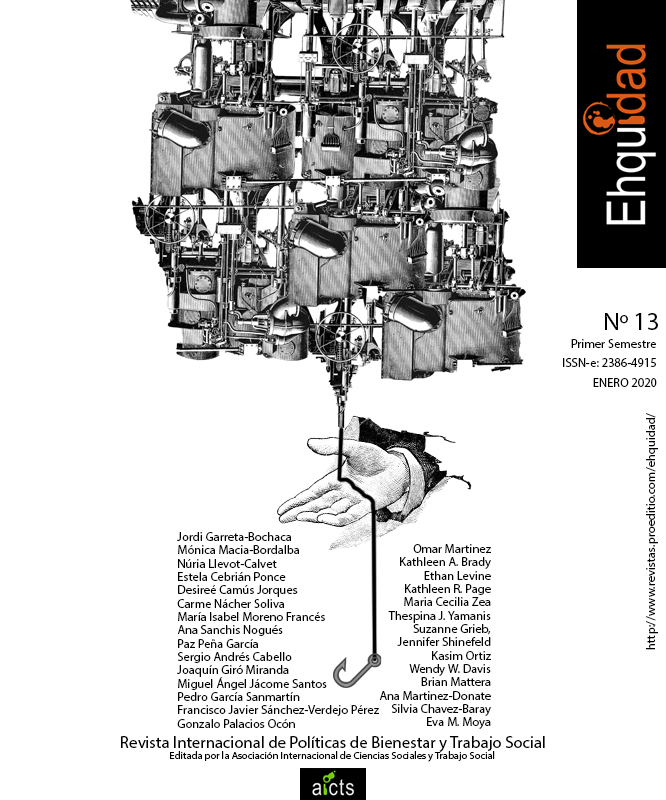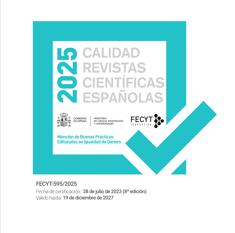Headmasters’ attitudes towards Religious Education in Catalonia (Spain)
DOI:
https://doi.org/10.15257/ehquidad.2020.0001Abstract
The teaching of religion in the Spanish education system has been, since its democracy began, a controversial issue that has been gaining strength as society has become more plural. In this context, this study analyses the attitudes of the management teams of the Autonomous Community of Catalonia towards religious education in schools. A mixed investigation has been carried out. To be more specific, a survey was conducted of 380 management team representatives (head teachers, heads of study and secretaries) and 25 in-depth interviews with this same profile of professionals and teachers of religious education. The results show that the majority of the members of the management teams consider that the teaching of denominational religions should be excluded from the education system and that an approach to religious diversity from a historical and cultural point of view would be preferable for enhancing students’ intercultural competence.
Downloads
References
Ajzen, I. (1991). The theory of planned behavior. Organizational Behavior and Human Decision Processes, 50(2), 179-211. Doi: http://dx.doi.org/10.1016/0749-5978(91)90020-T
Alberts, W. (2010). The academic study of religions and integrative religious education in Europe. British Journal of Religious Education, 32(3), 275-290. Doi: http://dx.doi.org/10.1080/01416200.2010.498621. Recuperado de https://goo.gl/uo179V
Barnes, L.P. (2015). Humanism, non-religious worldviews and the future of religious education. Journal of Beliefs & Values, 36(1), 79-91. Doi: http://dx.doi.org/10.1080/13617672.2015.1013816. Recuperado de https://goo.gl/WHZlH2
Centro de Investigaciones Sociológicas (2016). Estudio nº 3156. Barómetro de octubre de 2016. Madrid, Centro de Investigaciones Sociológicas.
Cush, D. (2007). Should religious studies be part of the compulsory state school curriculum? British Journal of Religious Education, 29(3), 217-227. Doi: http://dx.doi.org/10.1080/01416200701479471. Recuperado de https://goo.gl/9YwR0O
Dietz, G. (2008). La educación religiosa en España: ¿Contribución al diálogo intercultural o factor de conflicto entre religiones? Estudios sobre las Culturas Contemporáneas, XIV(28), 11-46. Recuperado de https://goo.gl/KWjVtt.
Faas, D., Darmody, M., y Sokolowska, B. (2016). Religious diversity in primary schools: reflections from the Republic of Ireland. British Journal of Religious Education, 38(1), 83-98. Doi: http://dx.doi.org/10.1080/01416200.2015.1025700. Recuperado de https://goo.gl/XiKdgA
Francis, J., Sion, T., McKenna, U., y Penny, G. (2017). Does Religious Education as an examination subject work to promote community cohesion? An empirical enquiry among 14- to 15-year-old adolescents in England and Wales. British Journal of Religious Education, 39(3), 303-316.
Franken, L. (2016). The freedom of religion and the freedom of education in twenty-first-century Belgium: a critical approach. British Journal of Religious Education, 38(3), 308-324. Doi: http://dx.doi.org/10.1080/01416200.2015.1113934.
Fullan, M. (2001). The new meaning of educational change. New York, Teachers College Press.
Garreta, J. (2000). Inmigrantes musulmanes en Cataluña. Los retos sociales, culturales y educativos de la diversidad religiosa. Revista Internacional de Sociología, 25, 151-176. Recuperado de https://goo.gl/9BSIor
Garreta, J. (2002). Inmigrantes musulmanes en una sociedad "laica". Procesos de creación, consolidación y retos de futuro de las mezquitas. Papers. Revista de Sociología, 66, 249-268. Recuperado de https://goo.gl/wDnWaF
Garreta, J. (2014). La interculturalidad en el sistema educativo, logros y retos. Gazeta de Antropología, 30(2), 1-26. Recuperado de https://goo.gl/vHMTyZ
Hand, M. (2015). Religious education and religious choice. Journal of Beliefs & Values, 36(1), 31-39. Doi: http://dx.doi.org/10.1080/13617672.2015.1013817. Recuperado de https://goo.gl/s04DcB
Jackson, R. (2014). The development and dissemination of Council of Europe policy on education about religions and non-religious convictions. Journal of Beliefs & Values, 35(2), 133-143. Doi: http://dx.doi.org/10.1080/13617672.2104.953295. Recuperado de https://goo.gl/SSu0gN
Kallioniemi, A., y Matilainen, M. (2011). Headmasters’ conceptions of the Finish religious education –Solution from the perspective of human rights. Nordidactica. Journal of humanities and social science education, 2, 1-14. Recuperado de https://goo.gl/am5cOk
Kamat, S., y Mathew, B. (2010). Religion, education and the politics of recognition: a critique and a counter-proposal. Comparative education, 46(3), 359-376. Doi: http://dx.doi.org/10.1080/03050068.2010.503746. Recuperado de https://goo.gl/Lyd4nU
Ley Orgánica para la Mejora de la Calidad Educativa (2013). Boletín Oficial del Estado, núm. 295, de 10 de diciembre de 2013.
Llevot, N., Bernad, O., Molet, C., Garreta, J., y Domingo, J. (2018). Diversidad religiosa en los centros escolares de Cataluña: religiones y multiculturalidad. Lleida, Milenio.
Martínez, J., Griera, MM., García, G., y Forteza, M. (2011). Inmigración, diversidad religiosa y centros de culto en la ciudad de Barcelona. Migraciones, 30, 101-133. Recuperado de https://goo.gl/Tc1fXT
Miedema, S. (2014). From religious education to worldview education and beyond: The strength of a transformative pedagogical paradigm. Journal for the Study of Religion, 27(1), 82-103. Recuperado de https://goo.gl/PxvYMT
Miles, M.B., Huberman, A.M., y Saldaña, J. (2014). Qualitative Data Analysis: A methods sourcebook (3rd ed.). Thousand Oaks, California: SAGE Publications.
O’Toole, B. (2015). 1831-2014: an opportunity to get it right this time? Some thoughts on the current debate on patronage and religious education in Irish primary schools. Irish Educational Studies, 34(1), 89-102. Doi: http://dx.doi.org/10.1080/03323315.2015.1010704. Recuperado de https://goo.gl/S6j1Lp
Pajares, M. F. (1992). Teachers' beliefs and educational research: cleaning up a messy construct. Review of Educational Research, 62(3), 307-332. Recuperado de https://goo.gl/3ETRfy
Pérez Agote, A. (2012). Cambio religioso en España: los avatares de la secularización. Madrid, Centro de Investigaciones Sociológicas.
Pérez Agote, A. (2015). Religion, politics and culture in Spain: towards a historical sociology of they differentiation and their relations. Politics and religión, 2,(IX), 213-232.
Rebolledo, T., Rodríguez, M.R., y Cárdenas, M.R (2015). Escuelas y diversidad cultural. Tramas/Maepova, 3(2), 40-62. Recuperado de https://goo.gl/IoCzoL
Rey, F. (2012). ¿Es constitucional la presencia del crucifijo en las escuelas públicas? Revista Jurídica de Castilla León, 27, 1-32.
Saabedra, D. (2016). Creencias docentes en torno a la Educación Religiosa Escolar Católica y su relación con la planificación de la enseñanza. Estudios Pedagógicos, XLII(3), 327-346.
Santos Rego, M.A. (2017). La educación intercultural y el pluralismo religioso: Propuestas pedagógicas para el diálogo. Educación XXI, 20(1), 17-35. Doi: http://dx.doi.org/10.5944/educXX1.12861. Recuperado de https://goo.gl/tRJ6W9
Tarrés, S., y Rosón, F.J. (2009). La enseñanza de las religiones minoritarias en la escuela. Análisis del caso de Andalucía. Ilu. Revista de Ciencias de las Religiones, 14, 179-197. Recuperado de https://goo.gl/RBMsBi
Thomas, D.R. (2006). A general inductive approach for analyzing qualitative evaluation data. American Journal of Evaluation, 27(2), 237-246. Doi: http://dx.doi.org/10.1177/1098214005283748. Recuperado de https://goo.gl/I3SKXu
Tillson, J. (2011). In favour of ethics education, against religious education. Journal of philosophy of education, 45(4), 675-688. Doi: http://dx.doi.org/10.1111/j.1467-9752.2011.00829.x. Recuperado de https://goo.gl/IsylHG
Wang, C. (2013). Fostering critical religious thinking in multicultural education for teacher education. Journal of Beliefs & Values, 34(2), 152-164. Doi: http://dx.doi.org/10.1080/13617672.2013.802127. Recuperado de https://goo.gl/QTcX3A
Watson, K. (2010). Contrasting policies towards (mainly) Christian education in different contexts. Comparative education, 46(3), 307-323. Doi: http://dx.doi.org/10.1080/03050068.2010.503743. Recuperado de https://goo.gl/xOEFDS
White, J. (2004). Should religious education be a compulsory school subject? British Journal of Religious Education, 26(2), 151-164. Doi: http://dx.doi.org/10.1080/01416200420042000181929. Recuperado de https://goo.gl/CMY8YD
Zilliacus, H., y Holm, G. (2013). “We have our own religion”: A pupil perspective on minority religion and ethics instruction in Finland. British Journal of Religious Education, 35(3), 282-296. Doi: http://dx.doi.org/10.1080/01416200.2012.750707. Recuperado de https://goo.gl/P2yRk4
Zilliacus, H., y Kallioniemi, A. (2016). Secular ethics education as an alternative to religious education –Finish teachers’ views. Journal of Beliefs & Values, 37(2), 140-150. Doi: http://dx.doi.org/10.1080/13617672.2016.1185231. Recuperado de https://goo.gl/TxdrLm












